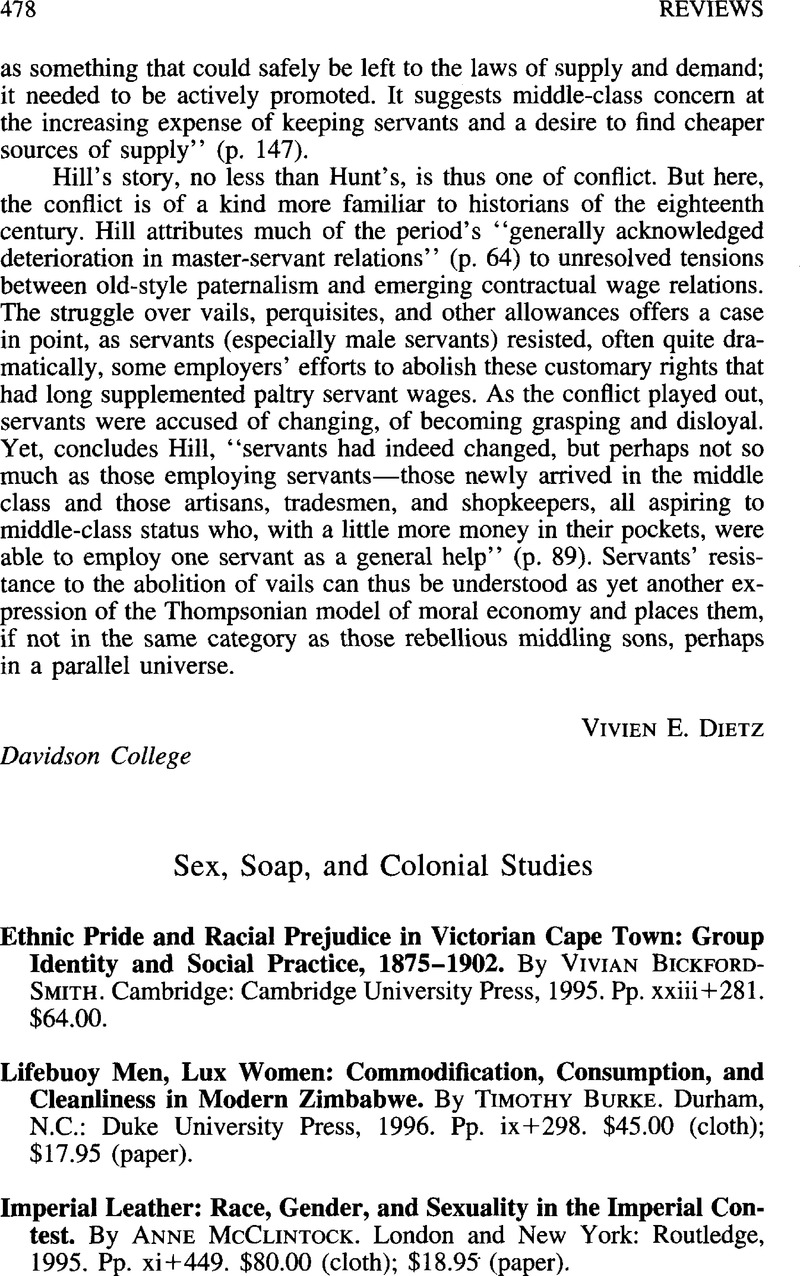Article contents
Sex, Soap, and Colonial Studies - Ethnic Pride and Racial Prejudice in Victorian Cape Town: Group Identity and Social Practice, 1875–1902. By Vivian Bickford-Smith. Cambridge: Cambridge University Press, 1995. Pp. xxiii + 281. $64.00. - Lifebuoy Men, Lux Women: Commodification, Consumption, and Cleanliness in Modern Zimbabwe. By Timothy Burke. Durham, N.C.: Duke University Press, 1996. Pp. ix + 298. $45.00 (cloth); $17.95 (paper). - Imperial Leather: Race, Gender, and Sexuality in the Imperial Contest. By Anne McClintock. London and New York: Routledge, 1995. Pp. xi + 449. $80.00 (cloth); $18.95 (paper). - Race and the Education of Desire: Foucault's History of Sexuality and the Colonial Order of Things. By Ann Laura Stoler. Durham, N.C.: Duke University Press, 1995. Pp. xiv + 237. $45.00 (cloth); $16.95 (paper). - Colonial Desire: Hybridity in Theory, Culture, and Race. By Robert J. C. Young. London and New York: Routledge, 1995. Pp. xiv + 237. $75.00 (cloth); $16.95 (paper).
Published online by Cambridge University Press: 10 January 2014
Abstract

- Type
- Reviews
- Information
- Copyright
- Copyright © North American Conference of British Studies 1999
References
1 The most obvious examples are Ballandier, Georges, “La situation coloniale: L'approche theoretique,” Cahiers internationaux sociologique 11 (1951): 44–79Google Scholar, and much of the rich work done through the Rhodes-Livingstone Institute in Lusaka, in what is today Zambia. This work documented colonial modernity long before anyone put these two terms together. See, e.g., the articles from the late 1950s reprinted in Epstein, A. L., Scenes from African Urban Life: Collected Copperbelt Essays (Edinburgh, 1992)Google Scholar, and Powdermaker, Hortense, Copper Town: The Human Situation on the Rhodesian Copperbelt (New York, 1966)Google Scholar. A superb, recent publication concerning fieldwork conducted over forty years ago suggests the extent of anthropologists' confusion over what they could say about the disruption they observed in colonial times (see Kershaw, Greta, Mau Maufrom Below [Athens, Ga., 1996]Google Scholar).
2 The best known of these is Ashcroft, Bill, Griffiths, Gareth, and Tiffin, Helen, The Empire Writes Back: Theory and Practice in Postcolonial Literature (London, 1989)CrossRefGoogle Scholar.
3 For the classic statement of this, see Lonsdale, John and Berman, Bruce, “Coping with the Contradictions: The Development of the Colonial State in Kenya,” Journal of African History 20 (1979): 487–506CrossRefGoogle Scholar; but also see the introduction and the articles collected in Cooper, Frederick and Stoler, Ann Laura, eds., Tensions of Empire: Colonial Cultures in a Bourgeois World (Berkeley and Los Angeles, 1997)CrossRefGoogle Scholar.
4 For the record, I was one of the publisher's readers for Stoler's book, and for my own research, I had read an earlier draft of Burke's manuscript.
5 See Davin, Anna, “Imperialism and Motherhood,” reprinted in Cooper, and Stoler, , eds., Tensions of Empire, pp. 87–151Google Scholar.
6 Burke, , Lifebuoy Men, pp. 39, 63–80Google Scholar. In South Africa, doctors and mine managers blamed the incidence of tuberculosis on Africans miners' inability to wash their clothes properly; see Packard, Randall M., “The ‘Healthy Reserve’ and the ‘Dressed Native’: Discourses on Black Health and the Language of Legitimation in South Africa,” American Ethnologist 16, no. 4 (1989): 686–703CrossRefGoogle Scholar.
7 See, e.g., Hyam, Ronald, Empire and Sexuality: The British Experience (Manchester, 1990)Google Scholar.
- 3
- Cited by




